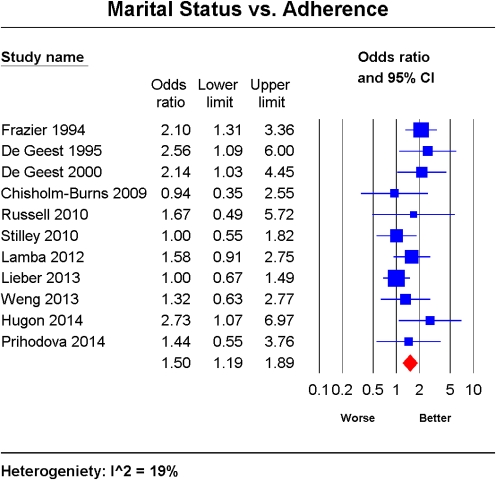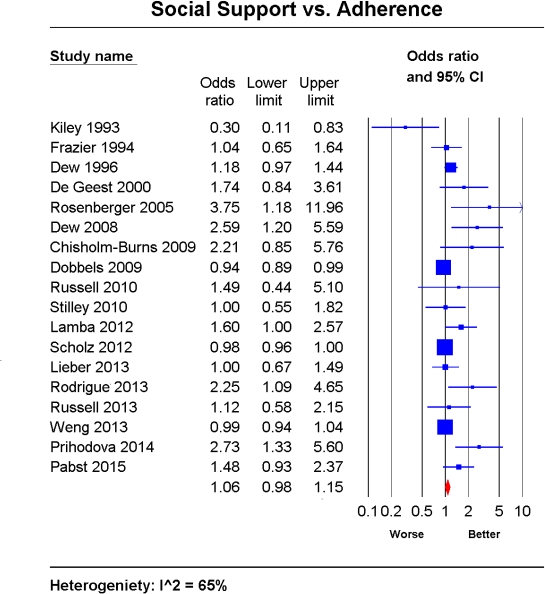Social Support Does Not Predict Medication Adherence Post-Transplantation: A Systematic Review and Meta-Analysis.
K. Ladin,1 A. Daniels,1 R. Bannuru,2 M. Osani.2
1Occupational Therapy, Tufts University, Medford, MA
2Public Health and Community Medicine, Tufts University School of Medicine, Boston, MA
3Division of Rheumatology, Tufts Medical Center, Boston, MA.
Meeting: 2016 American Transplant Congress
Abstract number: D277
Keywords: Outcome, Psychosocial, Risk factors
Session Information
Session Name: Poster Session D: Psychosocial and Treatment Adherence
Session Type: Poster Session
Date: Tuesday, June 14, 2016
Session Time: 6:00pm-7:00pm
 Presentation Time: 6:00pm-7:00pm
Presentation Time: 6:00pm-7:00pm
Location: Halls C&D
Background: Although social support is used to determine eligibility, the relationship between social support and nonadherence remains unclear. We examined the predictive value of social support for medication nonadherence.
Methods: Ten databases (e.g.PubMed, MEDLINE, PsychInfo, Cochrane) were searched from inception through 2015. Selected studies investigated the association between social support and medication nonadherence (self-report, electronic, labs, physician reported). Social support included marital status, received, or perceived support. Two reviewers independently extracted data and assessed study quality. Odds ratios and correlations were calculated. Effect sizes were pooled using random effects model.
Results: The 20 eligible studies (6 prospective and 14 retrospective, published 1993 -2015) included 3529 participants. Sample sizes varied from 37 to 544. Follow-up time ranged from 6 to 84 months post-transplant. Eleven studies examined marital status and nonadherence (OR=1.50; CI: 1.19, 1.89). Associations varied by organ: heart (OR=2.14; CI 1.03, 4.45), kidney (OR=1.74; CI: 1.28, 2.38); and liver (OR=1.13; CI 0.85, 1.50).  Eighteen studies examined social support and nonadherence (OR=1.06; CI: 0.98, 1.15). Associations varied by organ: heart (OR=1.22; CI 0.99, 1.51), kidney (OR=1.29, CI: 0.93, 1.79), and liver (OR=1.31; CI 0.92, 1.86).
Eighteen studies examined social support and nonadherence (OR=1.06; CI: 0.98, 1.15). Associations varied by organ: heart (OR=1.22; CI 0.99, 1.51), kidney (OR=1.29, CI: 0.93, 1.79), and liver (OR=1.31; CI 0.92, 1.86). 
Limitations: Observational studies and heterogeneity in definitions and assessments.
Conclusion: Marital status increased adherence modestly; received and perceived social support were non-predictive. Use of social support as a contraindication should be re-examined.
CITATION INFORMATION: Ladin K, Daniels A, Bannuru R, Osani M. Social Support Does Not Predict Medication Adherence Post-Transplantation: A Systematic Review and Meta-Analysis. Am J Transplant. 2016;16 (suppl 3).
To cite this abstract in AMA style:
Ladin K, Daniels A, Bannuru R, Osani M. Social Support Does Not Predict Medication Adherence Post-Transplantation: A Systematic Review and Meta-Analysis. [abstract]. Am J Transplant. 2016; 16 (suppl 3). https://atcmeetingabstracts.com/abstract/social-support-does-not-predict-medication-adherence-post-transplantation-a-systematic-review-and-meta-analysis/. Accessed February 15, 2026.« Back to 2016 American Transplant Congress
